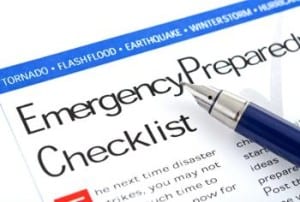
Emergency Action Plan
Every company should have an emergency action plan (EAP) that defines specific procedures that employees and management should follow during a crisis. This should include accidents, natural disasters and extreme weather. The procedures should define the chain of command, how employees should respond and communication procedures.
For example, a manufacturing company in a region prone to extreme winter weather should have preventative and post-event emergency procedures. The preventative procedures will instruct maintenance personnel to preemptively prepare and protect equipment and machines. Maintenance personnel should have safety supplies, such as ice melt and traction control products. The emergency action plan should also instruct management to send employees home early if necessary.
Communication Guidelines
The emergency action plan should set a communication hierarchy for both employees and management. Having an established communications channel will drastically reduce confusion and miscommunication during an emergency. Generally speaking, employees will report to their supervisors who will report to management. However, certain managers will play a key role in weather emergencies, such as HR, operations and maintenance managers.
Some office-based companies can simply send out a mass email to their employees who have company phones. Other companies will need to have an established framework for how to get in contact with employees during extreme weather. Because dealing with a weather crisis will be time-consuming, supervisors should rely on responsible employees to help maintain communication with their co-workers.
Employee Training
HR personnel should regularly review the emergency action plan with employees. There should also be specific training on how to respond to emergencies. For example, a business in an area prone to hurricanes or tornadoes should train employees how to quickly, yet safely respond to these situations. This will involve hands-on training with management facilitating mock drills that are timed and later evaluated.
HR personnel should also increase their employees’ knowledge of how to respond to natural disasters or weather emergencies while at home. Because most employees drive to work, companies should also provide training about safe driving in extreme weather. In areas prone to natural disasters, businesses should consider buying emergency equipment in bulk, such as flashlights or first aid kits, and offering them to employees at invoice price.
Alternate Work Options
When weather affects business operations, workers may be prevented from traveling to their office, but they still may be able to work. Therefore, there should be flexible alternative work options available for employees. Employees may live near a business branch, but work at another one further away. Ideally, they should be allowed to work out of the nearest office. On the other hand, certain employees may be able to perform their duties through telecommuting from home. This is most applicable to office employees, such as sales, computer and administrative personnel.
Resource: What do HR Managers Need to Know About Telecommuting and Employment Law?
To recap, extreme weather can potentially cause the business to lose revenue and fall behind schedule. The HR department can mitigate the negative effects of weather disasters through creating an emergency action plan, establishing communication guidelines and providing training and alternative work options. Because there are so many proven ways to prepare, businesses should be ready when weather affects business operations.